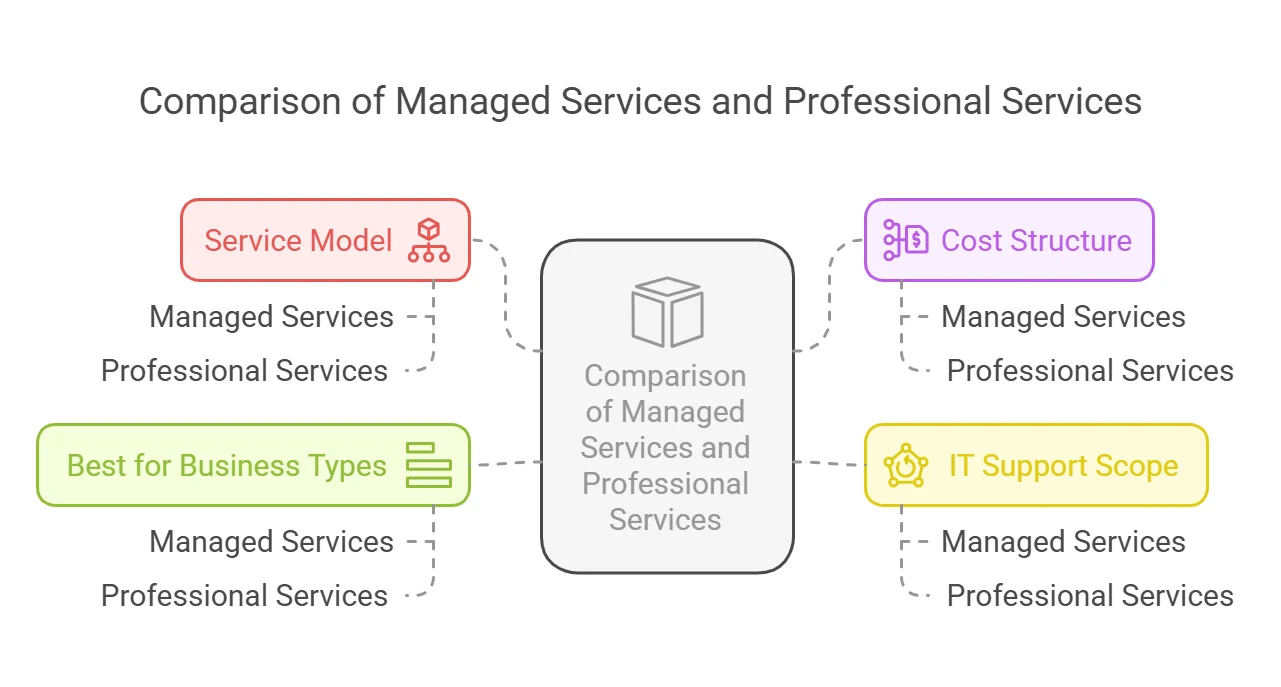Choosing between Managed Services vs. Professional Services can significantly impact your business’s IT efficiency, costs, and security.
Many businesses struggle with IT downtime, project delays, and unexpected costs because they don’t fully understand which IT support model best suits their needs.
According to a report, “The average cost of downtime across all industries has historically been about $5,600 per minute, but recent studies have shown this cost has grown to about $9,000 per minute.” If your business doesn’t have the right IT support in place, unexpected outages and security breaches can drain your revenue and damage your reputation.
| As Anthony Moussa, CEO, MooIT Solutions says, “IT support isn’t one-size-fits-all. Businesses need to align services with their goals to maximize efficiency.” |
So, how do you decide which model is best for your business? Let’s break it down.
Struggling to Choose the Right IT Model?Avoid costly mistakes and ensure your IT strategy aligns with your business goals. Get expert advice today. |
Understanding Managed Services vs. Professional Services
What Are Managed Services?
Managed Services is an IT support model where a third-party provider takes full responsibility for managing, maintaining, and securing a company’s IT infrastructure. Instead of hiring an in-house IT team, businesses outsource IT tasks to an external provider for a fixed monthly fee.
How Managed Services Work
With Managed Services, an IT provider continuously monitors, updates, and protects your systems to ensure smooth operations. This proactive approach prevents problems before they cause disruptions.
Key Features of Managed Services
✔️ 24/7 Monitoring & Support – Your systems are constantly monitored to detect and fix issues before they escalate.
✔️ Proactive Maintenance & Updates – Regular software updates, security patches, and performance optimizations.
✔️ Cybersecurity Protection – Firewalls, antivirus solutions, and intrusion detection systems to prevent cyber threats.
✔️ Fixed Monthly Pricing – Predictable costs with no surprise expenses.
✔️ Scalability – Services can expand as your business grows.
Who Should Use Managed Services?
🔹 Small and mid-sized businesses without an in-house IT team.
🔹 Companies that need 24/7 IT support and security monitoring.
🔹 Businesses looking to reduce IT downtime and improve efficiency.
🔹 Organizations that require ongoing compliance management (e.g., healthcare, finance).
Key Benefits of Managed Services
24/7 Monitoring & Rapid Incident Response
Managed services provide continuous monitoring of your IT infrastructure, ensuring early detection of issues like server failures, security threats, or software malfunctions. This proactive approach minimizes downtime and prevents disruptions.
For instance, if a cyberattack is attempted in the middle of the night, your managed service provider (MSP) can detect and neutralize the threat before it escalates. Without 24/7 oversight, your business could wake up to a full-scale security breach, leading to data loss and operational setbacks.
Cost Predictability & Budget Control
Managed services follow a fixed monthly pricing model, allowing businesses to avoid unexpected IT expenses. This structured approach helps with budget forecasting and prevents the financial strain of emergency IT repairs.
Studies show that businesses leveraging managed services can cut IT costs by up to 40% while improving efficiency by as much as 60%. Instead of dealing with costly, last-minute fixes, you gain long-term financial stability with a proactive IT strategy.
Enhanced Cybersecurity & Proactive Maintenance
With cyber threats growing in complexity, security can no longer be an afterthought. A staggering 43% of cyberattacks target small businesses, making robust protection essential.
Managed service providers take a proactive stance by implementing regular security patches, real-time threat monitoring, and risk assessments. Instead of responding to a breach after the damage is done, an MSP deploys advanced security measures—such as firewalls, endpoint protection, and zero-trust frameworks—to keep your network secure at all times.
Seamless Scalability & Business Growth Support
As businesses evolve, so do their IT needs. Managed services offer the flexibility to scale IT resources up or down without the challenges of hiring or training additional in-house staff.
Whether you’re expanding to new locations, integrating cloud solutions, or rolling out new software, an MSP ensures that your IT infrastructure adapts smoothly. This eliminates bottlenecks and allows your business to focus on growth rather than IT complexities.
What Are Professional Services?
Professional Services are project-based IT services that help businesses complete specific tasks, such as IT migrations, cloud transitions, software implementations, or cybersecurity audits. Unlike Managed Services, which provide ongoing IT support, Professional Services focus on one-time projects with a clear start and end date.
How Professional Services Work
Professional IT consultants analyze your business needs and develop a customized solution for your project. Once the project is complete, their involvement typically ends unless additional consulting is needed.
Key Features of Professional Services
✔️ Project-Based Approach – IT experts execute specific tasks like network design, security audits, or system upgrades.
✔️ On-Demand Expertise – Gain access to highly skilled professionals without long-term contracts.
✔️ Strategic IT Consulting – Get expert guidance for IT roadmaps, compliance, or cloud adoption.
✔️ Flexible Pricing – Pay only for the project scope, reducing long-term costs.
Who Should Use Professional Services?
🔹 Businesses undergoing digital transformation or major IT changes.
🔹 Companies needing expert consultants for cloud migrations or compliance audits.
🔹 Organizations requiring security risk assessments or penetration testing.
🔹 Businesses that lack internal expertise for complex IT projects.
Key Benefits of Professional Services
Short-Term, Goal-Oriented IT Projects
Professional services are ideal for businesses that require specialized IT expertise on a short-term or project basis. Whether it’s a cloud migration, a cybersecurity assessment, or a major infrastructure upgrade, these services deliver results within a defined timeline.
For example, if your business is transitioning to Microsoft 365, a professional IT service team can handle the entire migration process, minimize downtime, and ensure your staff is properly trained on the new system. This structured, project-based approach helps businesses achieve their IT goals efficiently.
Customized IT Solutions Tailored to Your Needs
No two businesses have the same IT challenges. Professional services provide customized solutions that align with your company’s specific requirements, whether it’s a one-time cybersecurity audit, a compliance assessment, or a full-scale network upgrade.
Instead of relying on generic IT support, professional services focus on strategic solutions designed to optimize your operations and ensure your technology investments align with long-term business objectives.
Strategic IT Consulting & Decision-Making Support
Technology plays a crucial role in business growth, but making the right IT decisions can be challenging. Professional services offer expert guidance to help you choose the best cloud infrastructure, security framework, or data management strategy based on your specific needs.
By leveraging the expertise of IT consultants, businesses can avoid costly mistakes, ensure compliance with industry regulations, and implement technology that enhances efficiency and security.
Seamless Technology Upgrades & Migrations
Keeping up with evolving technology is essential, but upgrading IT infrastructure can be a complex process. Professional services streamline these transitions, whether you’re replacing outdated hardware, migrating to a new software platform, or enhancing cybersecurity defenses.
With expert oversight, your business can implement new technology with minimal disruption, ensuring a smooth and efficient transition that supports long-term growth.
| Learn more about managed services and how they can help your business: |

Managed Services vs. Professional Services: Key Differences
| Factor | Managed Services | Professional Services |
| Pricing Model | Fixed monthly fee | One-time/project-based fee |
| Support Type | Ongoing IT management | Project-based IT support |
| Approach | Proactive & long-term | Reactive & short-term |
| Service Scope | Comprehensive IT maintenance | Specific IT projects |
| Best For | Businesses needing continuous IT support | Companies requiring specialized IT expertise for projects |
Can You Use Both Managed and Professional Services?
Yes! Many businesses combine both models to optimize their IT strategy.
Example Scenarios:
🔹 A company hires Professional Services for a cybersecurity audit, then switches to Managed Services for ongoing security monitoring.
🔹 A business migrates to the cloud with Professional Services, then maintains their cloud infrastructure with Managed Services.
🔹 A growing company uses Managed Services for everyday IT support but engages Professional Services for digital transformation projects.
This hybrid approach ensures both strategic IT improvements and long-term operational stability.
Conclusion: Choosing the Right IT Support Model
Understanding Managed Services vs. Professional Services helps businesses make smarter IT investments.
- Managed Services is best for businesses that need continuous IT management, security, and predictable costs.
- Professional Services is ideal for companies needing expert guidance for IT projects, migrations, and upgrades.
- Combining both services provides a balanced IT strategy for long-term growth.
Looking for the best IT solution for your business? Contact us today and get expert guidance tailored to your needs!
|
Discover our Range of IT Services in Newark:
|



